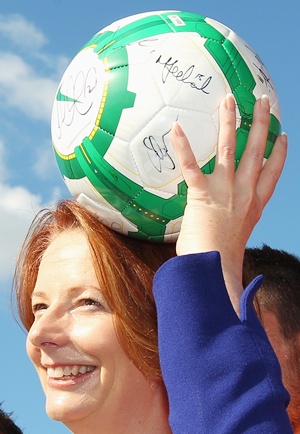 | « Back to article | Print this article |
Australian sports administrators responded angrily to a government report saying doping was widespread among professional and amateur athletes and demanded investigators name offenders to protect clean athletes' reputations.
The report released on Thursday, the result of a year-long probe by Australia's top criminal intelligence unit, said players and teams from several sports codes were implicated in the use of performance-enhancing drugs, but withheld names for legal reasons.
Wayne Bennett, a revered coach in Australia's National Rugby League competition, called the report's findings a "tragedy" that had tarnished all elite Australian athletes.
 "The game is not at fault here - it's the agencies who started it all yesterday and went so public," the Newcastle Knights coach said on Friday.
"The game is not at fault here - it's the agencies who started it all yesterday and went so public," the Newcastle Knights coach said on Friday.
"I don't believe sport has ever been as clean as it is now across all our codes.
"The game doesn't tolerate it and most coaches and most clubs don't either.
"Part of my beef with this is that if we've got the drug problem we have, what's the drug agency been doing?
"We pay them a lot of money to come into our sport and we've made a lot of compromises for them to come into our sport.
"Now they're telling us we've got a problem. I can't detect -- I've got no means to do that. We employ them to do that."
The release of the report coincided with an investigation into a prominent Australian Rules football club, which admitted concerns to anti-doping authorities about supplements administered to players by staff.
The investigation of the Melbourne-based Essendon Bombers has prompted local bookmakers to suspend betting on the team's season-opening match in the popular Australian Football League (AFL) competition next month and raised concerns about the role of unregulated sports scientists working for elite teams.
SWEEPING MEASURES
The AFL's governing body announced sweeping measures on Friday to crack down on dope cheats, including requiring teams to pre-register all drugs administered to players and conduct background checks on all staff.
Paul Roos, a former premiership-winning coach with AFL team Sydney Swans, said the report's authors should have provided more details, including at least the number of doping cases.
"I would have liked to have heard: 'look we have 35 examples across four codes. We're not going to give any details of names clearly because we're still investigating,' he said.
Former Australia fast bowler Brett Lee insisted cricket Down Under was clean. "I've put my body on the line every single day but I've done it properly," he told reporters.
"And I do believe that 99 per cent of people out there are doing the right thing so not everyone is tarred with the same brush.
"I've never seen anything in cricket that would lead me to believe that it's a dirty sport."
Australia's Prime Minister Julia Gillard described the report's findings as "sickening," while other top politicians demanded investigators quickly disclose more information about the cheats out of respect for the non-offenders.
World Anti-Doping Agency (WADA) chief John Fahey dismissed the calls as populist whingeing.
"The politicians, and I'm an 'ex' one, should stick to their knitting. They don't know what they're talking about," Fahey, a former premier of Australia's eastern state of New South Wales, told Reuters.
"We're all a bit frustrated that it takes time, but there has to be a proper process undertaken now for evidence to be gathered that may stand up.
"They ought to read the legislation that was passed by their parliament before making obviously self-serving, populist-type statements."
Photograph: Cameron Spencer/Getty Images
